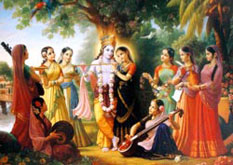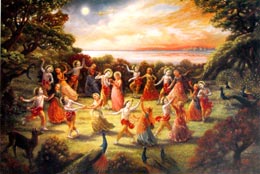All glories to Sri Guru and Sri Gauranga
The Line of Sri Rupa
Continued extract from Sri Guru and His Grace, Chapter Fourteen
by His Divine Grace Srila Bhakti Rakshak Sridhar Dev-Goswami Maharaj
Page One | Page Two | Page Three
|
An Ocean of Nectar
asabharair-amrta-sindhu-mayaih kathañchit
kalo mayatigamitah kila sampratam hi
tvam chet krpam mayi vidhasyasi naiva kim me
pranair vraje na cha varoru bakarinapi
This sloka is a direct prayer to Radharani. It expresses a particular type of hope which is so sweet and reassuring that it is compared with an unlimited ocean of nectar. He says, "With that hope I am somehow passing my days, flagging my days, dragging my life through these tedious times only for that hope. That hope is sustaining me, the nectarean ocean of hope is attracting me and sustaining me. Somehow I am dragging my days to my only safety.
"Otherwise, I have lost the direct association of Mahaprabhu, Svarup Damodar and so many other great souls, and still I am living. Why? I have a particular ray of hope. And the prospect and quality of my hope is very great and high. But my patience has reached its end. I can't endure it any longer. I can't wait. I am finished; I can't wait any more. At this moment if You do not show Your grace to me, I am finished. I shall lose the chance forever. I shall have no desire to continue my life. It will all be useless.
"Without Your grace, I can't stand to live another moment. And Vrindavan, which is even dearer to me than my life itself - I am disgusted with it. It is painful; it is always pinching me. What to speak of anything else, I am even disgusted with Krishna. It is shameful to utter such words, but I can have no love even for Krishna, until and unless You take me up within Your confidential camp of service. Such charm I have come for. I have seen the clue of such charm within the service of Your camp. Without that, everything is tasteless to me. And I can't maintain my existence even in Vrindavan. And even Krishna, what to speak of others, has no charm for me." This is the prayer of Raghunath Das Goswami.
Service of Radharani
So, Radha-dasyam, the servitorship of Srimati Radharani, is said to be the highest attainment of the living being by the school established by Mahaprabhu. It is the gist of the Srimad-Bhagavatam. It is Krishna's own version. He says in Srimad-Bhagavatam (11.14.15):
na tatha me priyatama atma-yonir na sankarah
na cha sankarsano na srir naivatma cha yatha bhavan
"O, Uddhava! Neither Brahma, nor Shiva, nor Baladev, nor Lakshmi, nor even My own self are as dear to Me as you are." And that Uddhava glorifies Vrindavan, the Vraja-gopis, and Radharani in this way in the Srimad-Bhagavatam (10.47.61):
asa maho charana-renu-jusam aham syam
vrndavane kim api gulma-latausadhinam
ya dustyajam sva-janam arya-patham cha hitva
bhejur mukunda-padavim srutibhir vimrgyam
|
"The Gopis of Vrindavan have given up the association of their husbands, sons and other family members, who are very difficult to renounce, and they have sacrificed even their religious principles to take shelter of the lotus feet of Krishna, which are sought after even by the Vedas. O! Grant me the fortune to be born as a blade of grass in Vrindavan, so that I may take the dust of those great souls upon my head."
The Search for Sri Radha
|
Uddhava has shown us the high position of the Gopis. And between all the Gopis and Radharani there is also a categorical difference. That was proved in rasa-lila. When Krishna and the Gopis openly displayed their transaction of heart, with that divine rasa flowing and inundating all directions, Radharani was also there. She gave the highest contribution to the common rasa-vilasa display of the parakiya-madhura-rasa, paramour mellow. Then, suddenly, dissatisfaction came in Radharani's heart. She began to think, "Am I also counted in the common flow of rasa?" Some reaction came within Her mind, and suddenly She left. After displaying Her peculiar type of super-excellent dancing and singing, introducing a flow of a new type there, suddenly She departed. She left the circle of the Rasa Dance. And Krishna suddenly found, "Radharani is not here. It is tasteless." The flow of rasa was there, but the gist, the quality, is a little down. He felt, "Why is it not so satisfactory to My inner heart?" He felt some ebb in the tide. And then by inspection He found that Radharani was absent. Disappointed, He left the circle of the Rasa Dance, and went to search after Her.
Although the parakiya-madhura-rasa, the highest mellow of conjugal love, Vrindavan, and the Gopis were all there, still there is a categorical difference in quality between the other Gopis and the particular camp of Radharani. In every way there is a categorical difference, both in quality and quantity. Jayadev Goswami, in his Gita-govinda (3.1) has described how Krishna left the circle of the Rasa Dance:
kamsarirapi samsara-vasana-baddha-srnkhalam
radham adhaya hrdaye tatyaja vraja-sundarih
"Lord Krishna took Srimati Radharani within His heart, for He wanted to dance with Her. In this way, He left the arena of the Rasa Dance and the company of all the other beautiful damsels of Vraja." Jayadev has described in this way that Krishna left the circle of the Rasa Dance, taking Radha within His heart. Krishna departed in search of Radharani. Her position is so exalted. It is said, "Lord Krishna's transcendental desires for loving exchanges could not be satisfied even in the midst of billions of Gopis. Thus He went searching after Srimati Radharani. Just imagine how transcendentally qualified She is!" (sata koti-gopite nahe kama nivapna).
The other Gopis numbered so many, but in quality they were a little less. Their total combination could not satisfy Krishna. The qualitative difference was there. That is found.
|
The Rupanuga-sampradaya, the followers of the line of Sri Rupa, are those who have the unique taste of service in the camp of Radharani. In that plane, there is no entrance of any mundane exploitation or renunciation, and not even legalised sastric devotion. The highest kind of devotion is not controlled by any law. It is spontaneous and automatic. Sacrifice to the highest degree is only possible in that camp. The highest kind of divine sentiment is distributed from the camp of Srimati Radharani, and that can never be compared with any attainment hitherto known even in the eternal factor of time and space.
|
|
|


